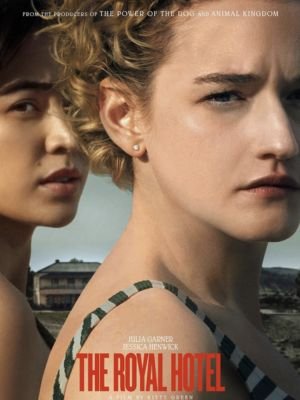
There’s plenty to like about men. The tall ones are fantastic for getting stuff down from high shelves. Some of them are thoughtful and smell great. Martin Scorsese seems very nice. But watching The Royal Hotel, it’s hard not to want to gather all the women on the planet and hatch a plan to colonize Mars.
The Royal Hotel is director Kitty Green’s follow-up to The Assistant, her stunning portrait of a day in the life of a woman who works for a Harvey Weinstein-esque movie producer starring Julia Garner. (Arguably one of the best films of 2020, it should have won its director and star a plethora of awards, but it seemed that Hollywood wasn’t quite ready to celebrate such an unflinching portrait of its own complacency in the abuse of women.) Green and Garner reunite for The Royal Hotel, loosely adapting Peter Gleeson’s documentary Hotel Coolgardie to depict the harrowing experiences of two women stranded in Green’s native Australia during a backpacking trip.
Best friends Hanna (Garner) and Liv (Jessica Henwick) hail from Canada, but have gone to the other side of the world to get away from an unspecified Bad Thing. We meet them partying on a yacht in a Sydney harbor, dancing and making out with cute boys while floating past the Opera House, But the party isn’t even over when reality hits, and credit cards get rejected. Needing cash fast, Hanna and Liv take up the only work on offer, bartending at a pub called The Royal Hotel in a remote mining town in the Outback. They warn them to expect “male attention” in a place with no phone signal, no WiFi, and barely any running water.
Things going badly wrong in the Australian outback is its own rich subgenre, encompassing the pre-apocalyptic action of Mad Max, the grisly serial killer of Wolf Creek, the nightmarish coming of age in Walkabout, and the more recent endurance test of Beaten to Death. But The Royal Hotel shares most in common with 1971’s Wake In Fright, in which a high school teacher finds himself stuck in a similarly isolated locale and is sucked in by a heady cocktail of masculine posturing and rampant alcohol abuse.
The gender of The Royal Hotel’s protagonists ups the threat, with the potential of sexual violence heavy in the air. The film also uses its dual protagonists to show the outcomes of two choices, with Hanna holding onto her personal boundaries while Liv adopts a naive “If you can’t beat ‘em, join ’em” approach to their menacing hosts. They arrive at the hotel as a pair of British bartenders prepare to depart, engaging in unhinged levels of debauchery on their way out the door, much to the local’s approval. Liv jokes that “That’ll be us in a few weeks’ time”, while Hanna looks in horror as the Brits dance on the bar and shag willing pub regulars mid-blackout.
The chasm between what they view as disturbing behaviour and harmless fun widens while Hanna and Liv work at the pub under the stewardship of its drunken owner, Billy (Hugo Weaving), and his long-suffering partner, Carol (Ursula Yovich). The local men take many forms, some having more straightforwardly sociopathic vibes, while others are deeply pathetic, wounded husks. But perhaps the most odious are the performative “nice guys” who, as many women know, are often the most dangerous. As much as The Royal Hotel doesn’t possess the gore and guts of Wolf Creek, it is undoubtedly a horror film. The characters are surrounded by monsters, trapped in a terrifying vortex of boozy misogyny, and the kindness of strangers is nowhere to be found.
Green’s knack for suspense and composition has a little more room to express itself within The Royal Hotel, not limited to a single day or single office building as The Assistant was. An outing to a local waterhole takes on an enchanting dreamlike quality, where the camera slows down to take in the wide landscapes and dappled sunlight. But Green can spin a nightmare with just much aplomb and frames scenes where an inebriated intruder appears in the doorway with all the nauseating dread of an escaped raptor entering a kitchen.
The creeping terror has all but disappeared by the final act, which descends into more explicit warfare and builds to one hell of a final shot. Womankind’s colonization of Mars may be a little while off, but this film is a convincing argument to get to work on those rocket ships.
Verdict
Kitty Green pulls no punches in her terrifying tale of a vacation gone very wrong. Julia Garner and Jessica Henwick are exceptional, both in the warm chemistry of their friendship and polarized reactions to the threat of male violence that surrounds them while the pair take work in an isolated Australian mining town to fund their travels further. It’s a distinctly less subtle look at misogyny than her #MeToo masterpiece The Assistant, but Green further distinguishes herself as one of the most exciting and provocative feminist filmmakers around.
Also, Read On Fmovies
